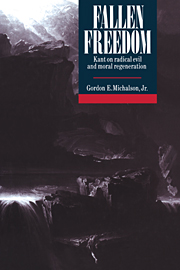4 - A “change of heart”
Published online by Cambridge University Press: 15 December 2009
Summary
How indeed can we expect something perfectly straight to be framed out of such crooked wood?
KantAre we devils?
The complexity of Kant's theory of radical evil guarantees that the question of moral regeneration will confront us with a maze of difficulties. The fundamental problem is clear: if radical evil is a corruption of the underlying disposition, and if the disposition is itself the source of moral regeneration, then the obligation to undertake moral regeneration appears to rest on an impossibility. On the other hand, if we simply admit our moral incapacity and put our trust in divine grace, then any resulting regeneration would not be a genuinely moral regeneration by Kant's standards, for the crucial element of autonomy would be missing. We thus seem stuck between debility and demand – between a corruption brought upon us by ourselves, and an obligation nonetheless to heal ourselves through a free but unspecifiable act.
Because of the way Kant has set the context for his account of moral regeneration, it is important to sort out the question of the sheer possibility of moral regeneration from the question of its actual process. The sheer possibility of moral regeneration is implicit in Kant's interesting comment that, though our fall into evil is radical, it does not mean that we have become “devils.” Devilishness would mean the intentional, outright rejection of the moral law for its own sake; it would mean the rejection of the moral law precisely because it is the moral law.
- Type
- Chapter
- Information
- Fallen FreedomKant on Radical Evil and Moral Regeneration, pp. 73 - 88Publisher: Cambridge University PressPrint publication year: 1990



